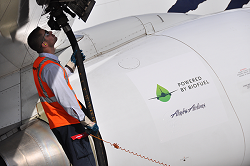 Officials at the Seattle-Tacoma International Airport are partnering with Alaska Airlines and Boeing to aim to have all flights out of the hub use sustainable aviation biofuel. This news release from the port authority says Sea-Tac is the first U.S. airport to lay out a long-term roadmap to incorporate aviation biofuel into its infrastructure in a cost-effective, efficient manner.
Officials at the Seattle-Tacoma International Airport are partnering with Alaska Airlines and Boeing to aim to have all flights out of the hub use sustainable aviation biofuel. This news release from the port authority says Sea-Tac is the first U.S. airport to lay out a long-term roadmap to incorporate aviation biofuel into its infrastructure in a cost-effective, efficient manner.
At the Sea-Tac fuel farm today, executives for the port, Alaska Airlines, and Boeing signed a Memorandum of Understanding (MOU) to launch a $250,000 Biofuel Infrastructure Feasibility Study that will assess costs and infrastructure necessary to deliver a blend of aviation biofuel and conventional jet fuel to aircraft at Sea-Tac, a crucial step toward routine biofuel use in the future.
“The Port of Seattle has an important role in helping develop the state’s green energy economy,” said Port of Seattle Commissioner John Creighton. “Striving to make Sea-Tac Airport a national leader in developing aviation biofuel infrastructure and incentivizing the use of biofuels by our airline partners will grow jobs for our region, decrease our environmental footprint, and benefit both our fence line communities and the airlines that use the airport.”
The partners’ longer-term plan is to incorporate significant quantities of biofuel into Sea-Tac’s fuel infrastructure, which is used by all 26 airlines and more than 380,000 flights annually at the airport. Sea-Tac is the 13th busiest airport in the U.S. and will serve over 42 million domestic and international passengers this year.
Joe Sprague, senior vice president of communications and external relations for Alaska Airlines, Sea-Tac’s largest carrier and leader of the airport’s fueling consortium, said the airline wants to incorporate biofuel into flight operations at one or more of its hubs by 2020, with Sea-Tac as a first choice for the Seattle-based airline.
“Biofuel offers the greatest way to further reduce our emissions,” said Sprague. “This study is a critical step in advancing our environmental goals and stimulating aviation biofuel production in the Pacific Northwest.”
The Port of Seattle will manage the study and the engineering and integration of biofuel infrastructure, such as the airport’s fuel farm. An RFP for the infrastructure study will be issued in the spring of 2016, and the study is expected to be completed by late 2016.

